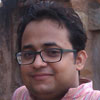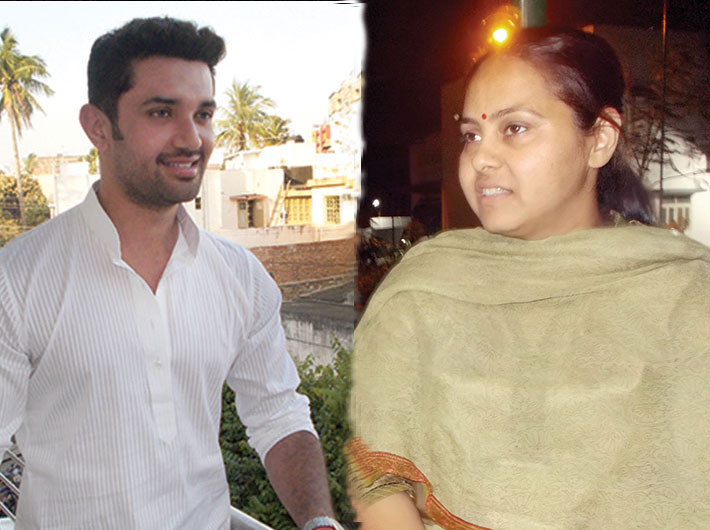Can Misa Bharti and Chirag Paswan live up to the expectations that come with their privileged entry into politics?
BOTH OF BIHAR'S MOST important barters for the upcoming Lok Sabha elections concern first-time contestants.
One is Chirag Paswan, the 32-year-old son of Lok Janshakti Party (LJP) chief Ram Vilas Paswan, who famously brokered the February re-entry of the party into NDA.
The other, a low-profile, though by no means insignificant, is Misa Bharti: the 37-year-old daughter of Rashtriya Janata Dal (RJD) chief Lalu Prasad (the eldest of his nine children) manuevered to get a ticket from Patliputra Lok Sabha constituency, even though it meant the exit of an angry Ram Kripal Yadav, Lalu’s most trusted aide of many years, to join the BJP – which immediately gave him the ticket to fight on the same seat.
There has been many more such last-moment switching of loyalties. Amid so much activity in a small time and space, we arrived in Patna to try and make sense of an apparently ubiquitous Narendra Modi leher – wave – said to be sweeping the Hindi heartland. I was accompanying writer and historian Patrick French, who has been studying Indian politics, particularly elections, for a while.
“WE DECIDED ON JAMUI” for Chirag, says Saurabh Pandey, who has a hair-band and wears beads on his wrist, because it was one place where “people gave him a very warm welcome”. Pandey, a Varanasi resident, is Chirag’s friend from school and has taken a few months off his legal practice in Mumbai to help the Paswan scion during the election.
We are sitting in the drawing room of a furnished double-floored building in Sri Krishna Puri area of Patna, which functions as Chirag’s residence-cum-office. On the table is kept a dated copy of the Urdu daily Aman Chain and an old invitation card for Saraswati Puja for mananiya – honourable – Chirag Paswan.
“Hi, Chirraag!” he suddenly announces himself with a vague accent, following it with a firm hand-shake. On his gym-toned chest sits a slim-fit white checked kurta, complemented below by blue jeans (the jeans are from True Religion). He wears three rings in right hand (including one on the thumb) and has red threads and a designer watch over the wrist.
Chirag was a model, then an actor, before he finally decided on politics: “I was getting lots of [modelling] offers right from college days.” And if not for the burden of joining politics immediately, he would have wanted to act for more films. He doesn’t see an inconsistency in this: “There you have viewers, here you have voters – you deal with the masses in both.”
Though the transition between careers has been rather smooth, success eludes Chirag: Miley Na Miley Hum, his debut film (a journalist told me the film was financed by his father), was also his last. As for Bihar politics, Chirag is no Ram Vilas – born into the caste of rat-eaters in a feudal village; Chirag was born to a young dynamic parliamentarian and an airhostess, brought up on privileges that anyone born into a politically powerful family is endowed with.
Chirag says he doesn’t believe in the caste system. But rather than acknowledging its importance as a mobilising force in Indian politics, he simply believes that with time caste would cease to matter.
Development is what the young generation wants: which is why “98 percent youth are polarised in favour of Narendra Modi” as the right person to lead the country, but he doesn’t see why Muslims shouldn’t vote for him.
“Earlier the issues were different – like the emergency; now we have problems like corruption.” Corruption was also at the root of Jayaprakash Narayan’s movement of the 1970s, of which his father is one of the four bonafide alumni in Bihar – along with Nitish Kumar, Lalu Prasad and Sushil Modi. It was the opposition to Indira Gandhi, who they saw as a product of dynastic privilege, that united them back then.
The idiom on privilege has changed in a generation. “A politician’s kid is a lot more aware about politics than others,” Chirag says. “A doctor’s son becomes a doctor, a lawyer’s son becomes a lawyer, without anyone questioning them.”
It’s easy to be outside the fence, Chirag argues. He chose to be inside the fence. What escaped him is that when he decided to contest from Jamui, it also meant that someone less privileged didn’t get a nomination.
LALU PRASAD ONCE DREAMT of becoming the prime minister. What does he think of it now? Speaking in his broken English has always won Lalu good publicity: “This is not Lalu Jadav’s agenda – who became, not became a prime minister.”
It’s a pleasant late-March evening, except that mosquitoes in the massive courtyard of Lalu’s Patna residence can’t seem to get enough of human blood. The 65-year-old RJD chief is busy doing what he does best: entertaining the audience.
Lalu never lets go an opportunity to remind everyone that he stopped Advani’s rath yatra in 1990 by arresting him in Samastipur, and thereby saving the state from a possible communal flare-up. We must have heard this countless times on TV, and we hear it all over again.
For 2014 his agenda has been updated: “Everyone saying Modi coming, coming, coming, coming. What coming! I am here.” A brief pause. “I know these cowards peepul [sic]. I will not allow these communal, fascist forces to disintegrate the country’s unity.
“At this juncture I can’t disclose, but there is an international conspiracy,” he says, trying to sound mysterious. “International forces have chosen a hardliner because they have a fight with Islam.” At another place such talk would pass off as drivel; here, in Lalu’s darbar, his word is gospel.
Lalu can’t seem to have enough fun out of the divorce between JD(U) and BJP that accompanied their “love marriage” of seven years: “Nitish Kumar is a no-factor in this election.” You doubt if he himself believes his words. Lalu is carried further by his eloquence: “I am appealing to all castes to save the nation. My combo is going to sweep the election.” More clichés are churned.
What if, say, by sheer chance, Rahul Gandhi becomes the prime minister? “Arre, brother – forget what will happen, not happen. This is not agenda. Agenda is: will country [be] broken, or will it be intact?”
Lalu is not interested in talking about dynasty politics. “This is not the real issue,” he says, a little annoyed. But can a self-made man like him attain the same success if he started in 2014? And why do most of the younger politicians come from political families?
“It’s a good thing; not bad. They have to go to the people. It’s not monarchy. Ye log baap ke saath ghoomta hai, usmein bhi toh sikhta hai (the younger lot moves around with their fathers, they learn from that).” The current generation, Lalu adds, understands things like social networking much better than he did when he started. He thanks his children for introducing him to Twitter: “Now I see what everyone else is up to.”
But you bring up Chirag and he suddenly becomes dismissive. “He is a child,” Lalu says about the son of his former ally. He believes LJP has committed an ideological suicide – “ekdum khatam” – by tying up with BJP: the entire “Paswan community is joining me.”
Presently Lalu calls for Tej Pratap, the elder of his two sons: “Kahaan hai jee, usko bulao.” Instead appears Tejaswi, the younger one, wearing a white kurta-pajama and red slippers; he quietly takes a chair near his father.
Once upon a time, Tejaswi aspired to become a cricketer: he played four cricket matches for Delhi’s IPL T20 team in 2009, in which his performance was less than impressive. He has an innocent face and speaks softly, slightly nervously.
I hurl an admittedly hard, if somewhat vague, question at Tejaswi, who will turn 25 this year: what would the new-generation politics of Bihar look like? He talks about targetting the youth who believe in a secular, socialist politics; about his father’s achievements (“we opened seven universities in the state”), et cetera et cetera.
Next comes Misa, who was busy campaigning in her constituency all day, exhausted. She is short and demure, and when she speaks you feel there is something deeper to her that doesn’t come out in the conversation.
“There was a conspiracy against my father,” she begins, because of which “he was put into jail and debarred from contesting” the upcoming polls. “This led to a dharm-sankat in the party. The party didn’t accept handing over the top job to Ram Kripal ji. In this crisis-hour the party needed someone from the family.” (Another version says she gave her father an ultimatum to save either the party or the family, and, before long, managed to have things her way.) That’s how Misa was given the Patliputra constituency.
“Ram Kripal ji was far too much in a hurry for power,” she says. In this election she will contest against two fellow Yadavs – Ram Kripal and Ranjan of JD (U) – both of whom were mentored by her father. Ranjan Yadav defeated Lalu in 2009, and part of her motivation to fight from Patliputra is to avenge that defeat.
Did she always know she would someday join the politics? “Yes, definitely,” Misa says, perhaps a little more confident than she wants to, explaining the origin of name ‘Misa’ that Jayaprakash Narayan – her idol – gave her as she was born during emergency and Lalu was in jail under the ‘Maintenance of Internal Security Act’.
Misa is flanked on the right by an aide who decides if her responses are good enough. When she explains her academic credentials – “I am a medical doctor by education” – he adds: “Two gold medals awarded by the president of India.” When Misa talks about the under-representation of women in politics and says RJD has fielded five seats to women this time, she looks at the aide to confirm the number. “Theek hai na?” she asks. He nods.
On the other side sits her quiet, modest husband, Shailesh. He is an IIT-IIM alumnus who, till very recently, was with a private firm in Mumbai. “I have been asked this question for 15 years,” Shailesh answers when asked whether he plans to enter politics. “I am a misfit,” he says, disarmingly innocent, “but giving up is not an option either.”
AS SOMEONE WHO HAS grown up hearing stories of these political families and how their descendents were born to conquer the world, I found the personal encounters unexpectedly anticlimactic. Not the least because the discrepancy between these scions’ personal motivation to join politics and the expectations that millions of supporters have from them is mammoth.
Patrick later said Lalu reminded him of the author VS Naipaul, the subject of a popular biography that he authored: they are both serious and theatrically playful at the same time. Maybe this had something to do with their Bhojpuri origin, Patrick joked. They were both men, I replied, who owed their success to being born at particular moments in history.

